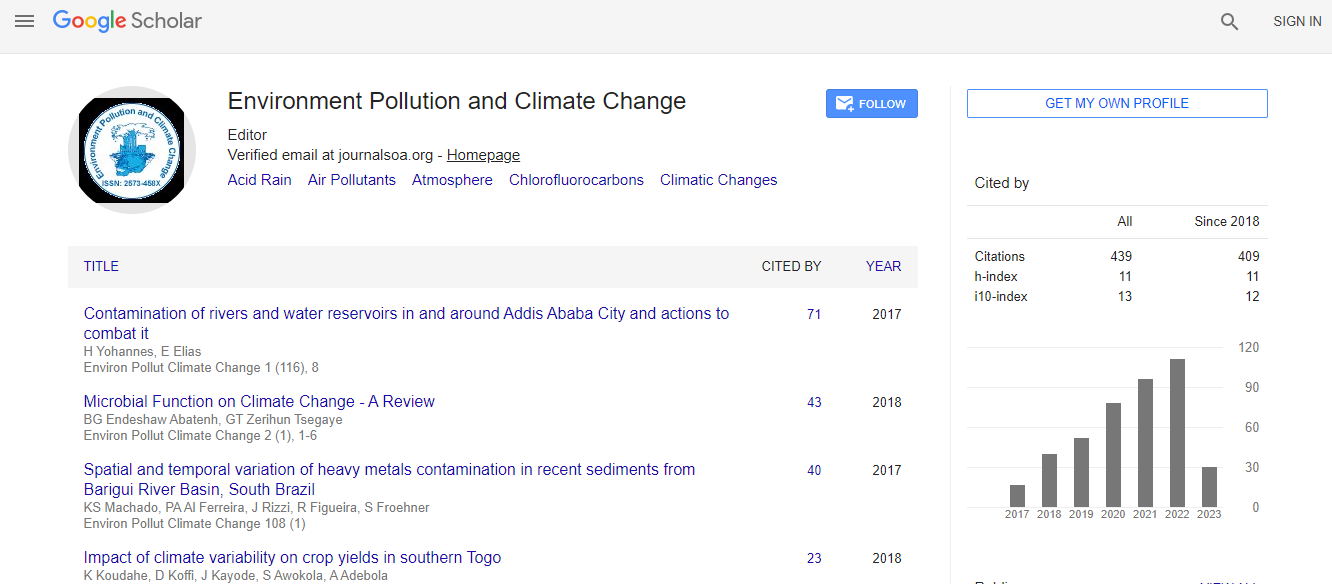Our Group organises 3000+ Global Conferenceseries Events every year across USA, Europe & Asia with support from 1000 more scientific Societies and Publishes 700+ Open Access Journals which contains over 50000 eminent personalities, reputed scientists as editorial board members.
Open Access Journals gaining more Readers and Citations
700 Journals and 15,000,000 Readers Each Journal is getting 25,000+ Readers
Google Scholar citation report
Citations : 672
Environment Pollution and Climate Change received 672 citations as per Google Scholar report
Environment Pollution and Climate Change peer review process verified at publons
Indexed In
- Google Scholar
- Publons
- Euro Pub
- ICMJE
Useful Links
Recommended Journals
Share This Page
Antarctic marine biodiversity and climate change
Joint Event on 5th World Conference on Climate Change & 16th Annual Meeting on Environmental Toxicology and Biological Systems
Simon A Morley
British Antarctic Survey, UK
Keynote: Environ Pollut Climate Change
Abstract
Human culture and food security rely on the ecosystem services provided by historic patterns of biodiversity. We therefore need to understand the factors that determine where species can and cannot live, and the impact of both natural and anthropogenic variation. Such predictions require an understanding of the mechanisms underlying species range limits, and how they are linked to climate. The Southern Ocean offers a “natural laboratory” for testing the evolutionary and physiological capacity of species in response to their environment. Its isolation has resulted in high levels of endemism and the lack of indigenous humans means that the environment is close to pristine. It is a constantly cold ocean but with large seasonal variation in light levels, primary productivity and pH. Animals living in the Southern Ocean have several physiological adaptations for life in the cold, including natural antifreeze, increased mitochondrial densities and the ability to grow to a large size. Life in the extreme cold has also resulted in a reduced ability to cope with warming. The activity limits for limpets and clams are only 1 to 2°C above current maximum summer temperatures. Comparisons of long-term oceanographic and reproductive data-sets have shown that one of the strongest signals affecting interannual variability in reproduction is El Niño, which causes dramatic changes in the coastal system. In addition to this understanding, the Western Antarctic Peninsula has been one of the fastest warming regions, resulting in massive changes in the cryosphere. The reduction in the duration of winter sea ice, an increase in energy transfer from the atmosphere and the increase in iceberg scour has resulted in dramatic changes in benthic communities. Findings from the Antarctic have taught us much about the evolution of physiological capacity and the evolution of marine communities across latitudes. Recent Publications 1. Ashton G V, Morley S A, Barnes D K A, Clark M S and Peck L S (2017) Warming by 1°C drives species and assemblage level responses in Antarctica’s marine shallows. Current Biology 27(17):2698–2705. 2. Watson S A, Morley S A and Peck L S (2017) Latitudinal trends in shell production cost from the tropics to the poles Science Advances 3(9):e1701362. 3. Morley S A, Nguyen K D, Peck L S, Lai C-H and Tan K S (2017) Can acclimation of thermal tolerance, in adults and across generations, act as a buffer against climate change in tropical marine ectotherms? J Therm. Biol. 68:195–199. 4. Morley S A, Suckling C S, Clark M S, Cross E L and Peck L S (2016) Long term effects of altered pH and temperature on the feeding energetics of the Antarctic sea urchin, Sterechinus neumayeri. Biodiversity 17:34–45. 5. Morley S A Chien-Hsian L, Clarke A, Tan K S, Thorne M A S and Peck L S (2014) Limpet feeding rate and the consistency of physiological response to temperature. J Comp Physiol. 184:563–570.Biography
Simon A Morley’s research has a latitudinal focus on understanding the mechanisms that determine species tolerance and plasticity. He is a trained Physiologist completing a PhD with the University of Liverpool in 1998 before a Postdoctoral position at the University of Bangor before he joined the British Antarctic Survey as a Fisheries Ecologist, and spent two years based at King Edward Point at the Island of South Georgia.
E-mail: smor@bas.ac.uk

 Spanish
Spanish  Chinese
Chinese  Russian
Russian  German
German  French
French  Japanese
Japanese  Portuguese
Portuguese  Hindi
Hindi 
